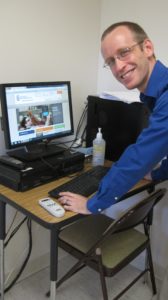
Assistant Professor of English Brenta Blevins
Brenta Blevins, Assistant Professor of English, and Zach Whalen, Associate Professor of English, with Lee Skallerup Bessette, Learning Design Specialist of Georgetown University (previously Instructional Technology Specialist at UMW). recently gave presentations that constituted a panel at the 2019 Computers and Writing Conference, held at Eastern Michigan University in East Lansing, MI in June 2019.
The panel, entitled “The Digital Studies 101 Website: Developing and Using an Ethical ‘Un-Textbook,’” described teaching Digital Studies 101 at UMW using the Digital Studies 101 DGST101.net website, which is a common, free, open educational website used in lieu of a physical textbook. In describing the development and uses of the UMW Digital Studies 101 website, the panel addressed the ethical priorities, pedagogical benefits, and curricular opportunities for UMW’s Digital Studies program. The presenters described the programmatic history and impetus for the initial development of the website; presented on continuing development, instructor use, and pedagogical implications of the website; and addressed student use of the website.

Associate Professor of English Zach Whalen
The DGST101.net OER resource has had 30,000 visits since 2016 and supports the #OpenEdVA initiative and the Commonwealth’s goals around open educational resources (OER).
This trio also presented a poster on this same topic at the Association for Computers and the Humanities (ACH) in Pittsburgh, PA, in July 2019. There they had the opportunity to talk one-on-one with Digital Humanities faculty and staff from around the world.
At the same conference, Blevins also presented her project “Developing Avatar Ethos in Mixed Reality Protests” analyzing the rhetorical strategies recent protesters in Spain, France, and South Korea employed using Mixed Reality, a medium that combines virtual elements with material objects. When in-person gatherings have been legally banned or prohibited by such existential threats as terrorism, protesters have used digital technology to create virtual avatars for demonstrating at physical protest sites. While the three analyzed protests all successfully used Mixed Reality to achieve traditional protest aims related to political and environmental activism, these technologies in the future could be disrupted or employed by counter-protesters, to attack or misrepresent protesters, or otherwise subvert demonstrations.
Finally, at the same conference, Whalen also presented a paper as part of a cross-institutional panel on “What Do We Teach When We Teach DH across Disciplines?”